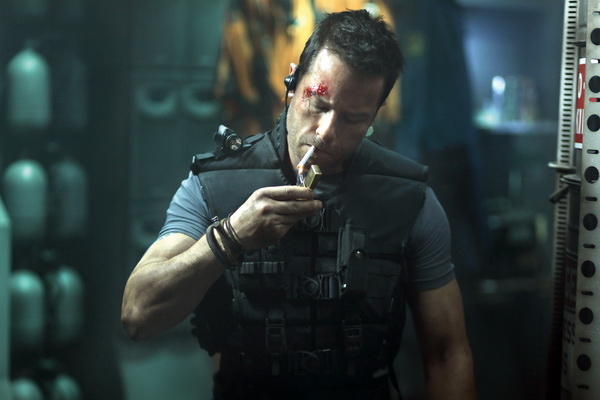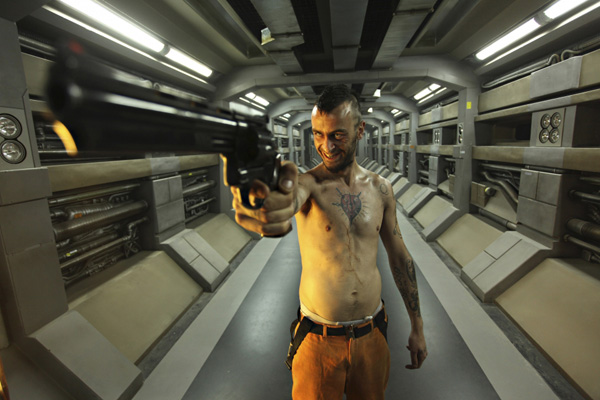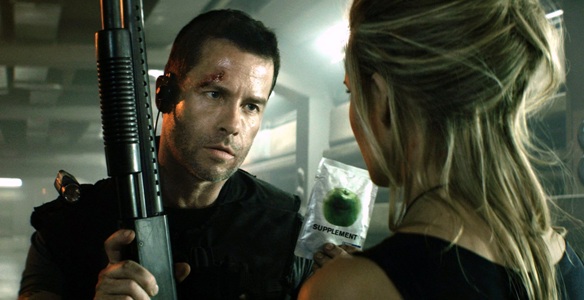Lockout Review
Steven's Rating: 6/10
Player Affinity Composite Rating: 6.3/10
(2 reviews total)
It’s fair to say Luc Besson has gotten a bit giddy ever since
Taken. The man who once upon a time brought us
La Femme Nikita and
Leon: The Professional has has instead taken to lighter action fare, in this case recruiting amateurs James Mather and Stephen St. Leger to help write and direct his “original idea.” Exactly—not a “story by” credit, but “original idea.”
That’s not to say Lockout isn’t creative, but it’s definitely not original. Some might dub it “Taken in space,” especially considering it borrows that film’s starlet in Maggie Grace, but it’s much more akin to “Escape from New York in space.” Either way, Lockout is another simple-concept action film from Besson, only it has a sense of self-importance that gets in the way sometimes.
 Lockout is built for kicks, a fact of which it’s very aware. Guy Pearce is Snow, the morally questionable reluctant hero written so closely to the archetype he nearly transcends it, weirdly. He has a sense of humor best described as abundant (though sometimes quite clever), and Pearce plays him especially wry; most actors (think Nicolas Cage) would’ve hammed it up too much or been unconvincing.
Snow is tasked with rescuing the president’s daughter (Grace), who is stuck on a maximum-security prison in space that has incurred a major security breach. These are the world’s most dangerous criminals, plus they have been in stasis for any number of years, which has made them even nuttier. Joseph Gilgun as Rydell, one of two Scottish prisoners trying to run the uprising, is a particularly deranged fellow reminiscent of a demented Groundskeeper Willie.
Lockout is built for kicks, a fact of which it’s very aware. Guy Pearce is Snow, the morally questionable reluctant hero written so closely to the archetype he nearly transcends it, weirdly. He has a sense of humor best described as abundant (though sometimes quite clever), and Pearce plays him especially wry; most actors (think Nicolas Cage) would’ve hammed it up too much or been unconvincing.
Snow is tasked with rescuing the president’s daughter (Grace), who is stuck on a maximum-security prison in space that has incurred a major security breach. These are the world’s most dangerous criminals, plus they have been in stasis for any number of years, which has made them even nuttier. Joseph Gilgun as Rydell, one of two Scottish prisoners trying to run the uprising, is a particularly deranged fellow reminiscent of a demented Groundskeeper Willie.
 Both Rydell and the other main baddie, Alex (Vincent Regan), have a cold-blooded edge that could have made for an effective R-rated ransom thriller reminiscent of late ‘90s films like Air Force One, but the devil-may-care attitude of the entire movie ultimately clashes with these darker moments, even though they do make you take the film more seriously than you would otherwise.
After a little bit of context at the beginning to properly motivate Snow, both he and us are effectively shot from a canon. The story only slows down a bit toward the end, but it mostly plays out as a series of dominoes. The action doesn’t satisfy so much as the pace and the threat of violence (now here’s a good example of how you do PG-13 violence), but it’s well done aside from an opening motorcycle sequence shot on green screen and outfitted with an effects job that really shows the budget.
Aside from that, the futuristic sci-fi elements stay pretty classy—nothing overdone or distracting. The gadgets provide some creativity to a number of the sequences and the script manages to inject some unpredictability into a story that could not have a more obvious trajectory.
Both Rydell and the other main baddie, Alex (Vincent Regan), have a cold-blooded edge that could have made for an effective R-rated ransom thriller reminiscent of late ‘90s films like Air Force One, but the devil-may-care attitude of the entire movie ultimately clashes with these darker moments, even though they do make you take the film more seriously than you would otherwise.
After a little bit of context at the beginning to properly motivate Snow, both he and us are effectively shot from a canon. The story only slows down a bit toward the end, but it mostly plays out as a series of dominoes. The action doesn’t satisfy so much as the pace and the threat of violence (now here’s a good example of how you do PG-13 violence), but it’s well done aside from an opening motorcycle sequence shot on green screen and outfitted with an effects job that really shows the budget.
Aside from that, the futuristic sci-fi elements stay pretty classy—nothing overdone or distracting. The gadgets provide some creativity to a number of the sequences and the script manages to inject some unpredictability into a story that could not have a more obvious trajectory.
 Despite the self-awareness at points, with a lot of that credit going to Pearce, Lockout tries especially hard to be entertaining on too many fronts, aspiring to be the consummate popcorn flick rather than just identifying one tone and sticking with it. The final scene on the space prison strangely evokes the original “Star Wars” Death Star run, as if to make sure the audience gets to munch on some sci fi/fantasy before the credits roll.
It’s hard to fault Lockout for aiming to please considering that that spirit seems to be the driving force behind the movie’s strengths as well as its weaknesses. Although the number of attempts at humor might catch some folks off guard, Lockout offers what anyone interested in the film would expect, if for no other reason than its built upon tons of famiiar tropes from previously effective movies. In turn, Lockout is also effective, but not too much more.
Despite the self-awareness at points, with a lot of that credit going to Pearce, Lockout tries especially hard to be entertaining on too many fronts, aspiring to be the consummate popcorn flick rather than just identifying one tone and sticking with it. The final scene on the space prison strangely evokes the original “Star Wars” Death Star run, as if to make sure the audience gets to munch on some sci fi/fantasy before the credits roll.
It’s hard to fault Lockout for aiming to please considering that that spirit seems to be the driving force behind the movie’s strengths as well as its weaknesses. Although the number of attempts at humor might catch some folks off guard, Lockout offers what anyone interested in the film would expect, if for no other reason than its built upon tons of famiiar tropes from previously effective movies. In turn, Lockout is also effective, but not too much more.
 Simon thought:
Simon thought: "A salute to Guy Pearce: an actor who can both commit to a role and have fun with it at the same time.
Lockout is a Grade-A B-movie and we know it, he knows it and he flings crackling one-liners with glee and zeal. There are some moments of goof in Luc Besson’s
Lockout that would make Ed Wood groan, but for the most part the effects look sharp the premise is fun and we’re treated to the kind of cartoonish villains that only make it to the screen due to unintentionally bad acting. This is an example of pure, unadulterated, feckless entertainment that exists only to please, not to challenge."
Rating: 6.5/10
 Lockout is built for kicks, a fact of which it’s very aware. Guy Pearce is Snow, the morally questionable reluctant hero written so closely to the archetype he nearly transcends it, weirdly. He has a sense of humor best described as abundant (though sometimes quite clever), and Pearce plays him especially wry; most actors (think Nicolas Cage) would’ve hammed it up too much or been unconvincing.
Snow is tasked with rescuing the president’s daughter (Grace), who is stuck on a maximum-security prison in space that has incurred a major security breach. These are the world’s most dangerous criminals, plus they have been in stasis for any number of years, which has made them even nuttier. Joseph Gilgun as Rydell, one of two Scottish prisoners trying to run the uprising, is a particularly deranged fellow reminiscent of a demented Groundskeeper Willie.
Lockout is built for kicks, a fact of which it’s very aware. Guy Pearce is Snow, the morally questionable reluctant hero written so closely to the archetype he nearly transcends it, weirdly. He has a sense of humor best described as abundant (though sometimes quite clever), and Pearce plays him especially wry; most actors (think Nicolas Cage) would’ve hammed it up too much or been unconvincing.
Snow is tasked with rescuing the president’s daughter (Grace), who is stuck on a maximum-security prison in space that has incurred a major security breach. These are the world’s most dangerous criminals, plus they have been in stasis for any number of years, which has made them even nuttier. Joseph Gilgun as Rydell, one of two Scottish prisoners trying to run the uprising, is a particularly deranged fellow reminiscent of a demented Groundskeeper Willie.
 Both Rydell and the other main baddie, Alex (Vincent Regan), have a cold-blooded edge that could have made for an effective R-rated ransom thriller reminiscent of late ‘90s films like Air Force One, but the devil-may-care attitude of the entire movie ultimately clashes with these darker moments, even though they do make you take the film more seriously than you would otherwise.
After a little bit of context at the beginning to properly motivate Snow, both he and us are effectively shot from a canon. The story only slows down a bit toward the end, but it mostly plays out as a series of dominoes. The action doesn’t satisfy so much as the pace and the threat of violence (now here’s a good example of how you do PG-13 violence), but it’s well done aside from an opening motorcycle sequence shot on green screen and outfitted with an effects job that really shows the budget.
Aside from that, the futuristic sci-fi elements stay pretty classy—nothing overdone or distracting. The gadgets provide some creativity to a number of the sequences and the script manages to inject some unpredictability into a story that could not have a more obvious trajectory.
Both Rydell and the other main baddie, Alex (Vincent Regan), have a cold-blooded edge that could have made for an effective R-rated ransom thriller reminiscent of late ‘90s films like Air Force One, but the devil-may-care attitude of the entire movie ultimately clashes with these darker moments, even though they do make you take the film more seriously than you would otherwise.
After a little bit of context at the beginning to properly motivate Snow, both he and us are effectively shot from a canon. The story only slows down a bit toward the end, but it mostly plays out as a series of dominoes. The action doesn’t satisfy so much as the pace and the threat of violence (now here’s a good example of how you do PG-13 violence), but it’s well done aside from an opening motorcycle sequence shot on green screen and outfitted with an effects job that really shows the budget.
Aside from that, the futuristic sci-fi elements stay pretty classy—nothing overdone or distracting. The gadgets provide some creativity to a number of the sequences and the script manages to inject some unpredictability into a story that could not have a more obvious trajectory.
 Despite the self-awareness at points, with a lot of that credit going to Pearce, Lockout tries especially hard to be entertaining on too many fronts, aspiring to be the consummate popcorn flick rather than just identifying one tone and sticking with it. The final scene on the space prison strangely evokes the original “Star Wars” Death Star run, as if to make sure the audience gets to munch on some sci fi/fantasy before the credits roll.
It’s hard to fault Lockout for aiming to please considering that that spirit seems to be the driving force behind the movie’s strengths as well as its weaknesses. Although the number of attempts at humor might catch some folks off guard, Lockout offers what anyone interested in the film would expect, if for no other reason than its built upon tons of famiiar tropes from previously effective movies. In turn, Lockout is also effective, but not too much more.
Despite the self-awareness at points, with a lot of that credit going to Pearce, Lockout tries especially hard to be entertaining on too many fronts, aspiring to be the consummate popcorn flick rather than just identifying one tone and sticking with it. The final scene on the space prison strangely evokes the original “Star Wars” Death Star run, as if to make sure the audience gets to munch on some sci fi/fantasy before the credits roll.
It’s hard to fault Lockout for aiming to please considering that that spirit seems to be the driving force behind the movie’s strengths as well as its weaknesses. Although the number of attempts at humor might catch some folks off guard, Lockout offers what anyone interested in the film would expect, if for no other reason than its built upon tons of famiiar tropes from previously effective movies. In turn, Lockout is also effective, but not too much more.
 Simon thought: "A salute to Guy Pearce: an actor who can both commit to a role and have fun with it at the same time. Lockout is a Grade-A B-movie and we know it, he knows it and he flings crackling one-liners with glee and zeal. There are some moments of goof in Luc Besson’s Lockout that would make Ed Wood groan, but for the most part the effects look sharp the premise is fun and we’re treated to the kind of cartoonish villains that only make it to the screen due to unintentionally bad acting. This is an example of pure, unadulterated, feckless entertainment that exists only to please, not to challenge." Rating: 6.5/10
Simon thought: "A salute to Guy Pearce: an actor who can both commit to a role and have fun with it at the same time. Lockout is a Grade-A B-movie and we know it, he knows it and he flings crackling one-liners with glee and zeal. There are some moments of goof in Luc Besson’s Lockout that would make Ed Wood groan, but for the most part the effects look sharp the premise is fun and we’re treated to the kind of cartoonish villains that only make it to the screen due to unintentionally bad acting. This is an example of pure, unadulterated, feckless entertainment that exists only to please, not to challenge." Rating: 6.5/10